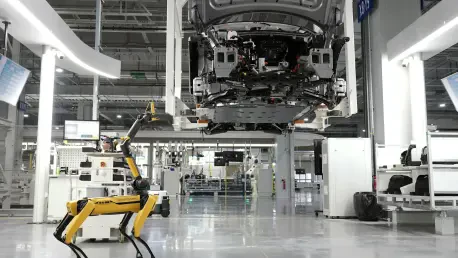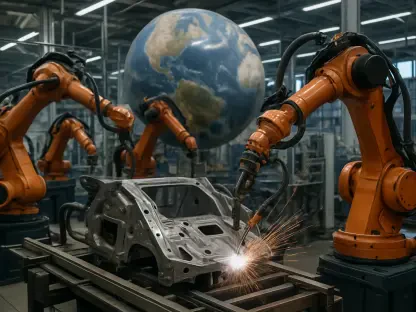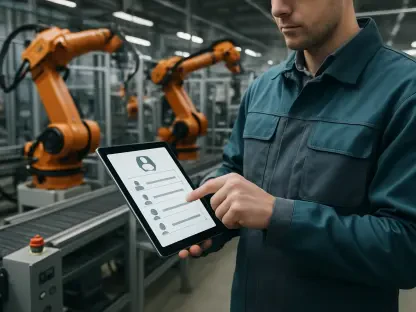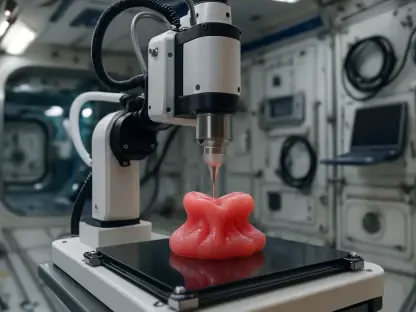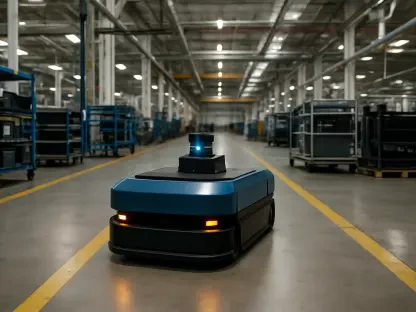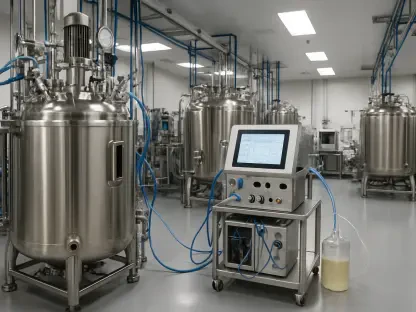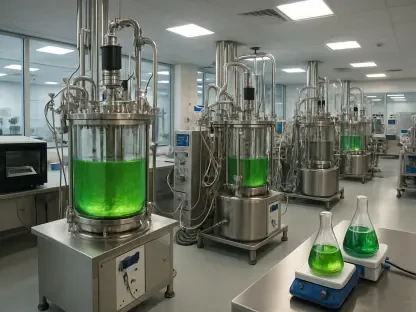Georgia Tech stands as a beacon of innovation, leading a profound transformation in the manufacturing sector through its pioneering Georgia Artificial Intelligence in Manufacturing (AIM) initiative. This ambitious program is not merely about adopting cutting-edge technology but about redefining how industries operate across Georgia by embedding Artificial Intelligence (AI) into practical, everyday solutions. From bustling urban factories to quiet rural farms, the impact of this initiative is felt statewide, demonstrating a remarkable blend of academic prowess and real-world application. Political analyst Bill Crane, despite his deep-rooted loyalty to the University of Georgia, openly praises Georgia Tech’s efforts, acknowledging their role in driving progress that benefits diverse communities. This transformation speaks to a broader vision—one where technology bridges gaps, solves pressing challenges, and sets a new standard for industrial and economic growth in the region. The following exploration delves into how Georgia Tech is making this vision a reality through collaboration, innovation, and strategic investments.
Building Bridges with Collaborative Networks
Georgia Tech’s Georgia AIM initiative, fueled by a substantial $65-million federal grant, exemplifies the power of collaboration in advancing AI across manufacturing and beyond. This program extends its reach to all 159 counties in Georgia, creating a robust network that includes middle and high schools, technical colleges, universities, and private sector partners. The initiative’s commitment to inclusivity ensures that AI’s transformative potential touches every segment of society, from urban hubs to remote rural areas. Events like Georgia AIM Week, held in cities such as Carrollton, Albany, and Savannah, serve as platforms to showcase and share technological advancements, making sophisticated tools accessible to a wide audience. This collaborative framework not only democratizes access to AI but also fosters a culture of shared learning and innovation, positioning Georgia as a leader in integrating technology into diverse industrial landscapes with an eye toward sustainable progress.
The strength of Georgia AIM lies in its ability to unite varied stakeholders under a common goal of technological advancement in manufacturing. By engaging educational institutions at all levels, the initiative ensures that the next generation is equipped with the skills needed to thrive in an AI-driven world. Partnerships with private entities further amplify the impact, as businesses bring real-world challenges to the table, allowing for tailored AI solutions that address specific needs. This synergy between academia and industry creates a dynamic ecosystem where ideas are tested, refined, and implemented with precision. Moreover, the statewide approach guarantees that no community is left behind, breaking down barriers that often limit access to cutting-edge resources in less populated regions. Through this collaborative model, Georgia Tech is not just introducing AI but embedding it as a fundamental component of Georgia’s industrial and economic fabric, promising long-term benefits for all involved.
Solving Real-World Problems with AI Applications
One of the standout aspects of Georgia Tech’s work through Georgia AIM is its focus on applying AI to tackle tangible challenges in manufacturing and related fields. At Southwire in Carrollton, for instance, middle school students are being introduced to coding and even creating music using AI tools, sparking an early interest in technology that could shape their future careers. This hands-on approach demonstrates how AI can be a gateway to innovation, inspiring young minds to think creatively about problem-solving. Beyond just education, these initiatives show how technology can integrate into industrial settings, enhancing processes and productivity. By starting with the youth, Georgia Tech ensures that the seeds of technological curiosity are planted early, paving the way for a workforce that is inherently comfortable with AI applications in manufacturing and other sectors over time.
In parallel, Georgia AIM is making significant strides in agriculture and agribusiness, proving AI’s versatility across industries. In Albany, a technical college has become a hub for showcasing AI-driven innovations such as blockchain data applications, hydroponics, and aquaponics. These advancements hint at a future where farming and food production are revolutionized through technology, optimizing resources and increasing efficiency. Such applications are not abstract concepts but practical tools that address real needs, from improving crop yields to streamlining supply chains. The focus on agribusiness alongside manufacturing underscores Georgia Tech’s holistic approach, recognizing that AI’s potential extends beyond factory floors to fields and farms. This dual emphasis ensures that industries critical to Georgia’s economy benefit from technological progress, reinforcing the state’s position as a hub of innovation where AI is a catalyst for comprehensive industrial transformation.
Fostering Economic Recovery with Smart Solutions
In the wake of natural disasters like Hurricane Helene, which struck rural Georgia with devastating force, Georgia Tech’s AI initiatives offer a critical lifeline for economic recovery. The Rural Supply Chain Initiative under Georgia AIM has proven instrumental in supporting businesses battered by such calamities. A prime example is Sunnyland Farms, a third-generation pecan farm in Albany spanning 1,760 acres, which suffered immense losses due to the storm. By leveraging AI to analyze shipping data, the initiative helped reduce costs by hundreds of thousands of dollars, providing much-needed financial relief. This intervention highlights how technology can address immediate economic challenges, offering scalable solutions that help businesses regain their footing. Georgia Tech’s role here extends beyond innovation to resilience, ensuring that rural economies can weather crises with the aid of intelligent systems.
The broader implications of such AI-driven support are profound, particularly for regions often overlooked in technological advancements. Rural Georgia, with its unique set of challenges, benefits immensely from targeted initiatives that adapt AI to local needs. The success at Sunnyland Farms is a testament to how data-driven insights can transform operational efficiencies, cutting costs and optimizing resources even in the face of adversity. This approach not only aids recovery but also builds a foundation for long-term sustainability, as businesses learn to integrate AI into their core operations. Georgia Tech’s efforts through Georgia AIM illustrate a commitment to not just urban industrial centers but also to the heart of rural economies, ensuring that technology serves as a tool for inclusive growth. By addressing economic vulnerabilities with smart solutions, the initiative sets a precedent for how AI can be a cornerstone of rebuilding stronger, more resilient communities across the state.
Powering Progress with Strategic Investments
Georgia Tech’s leadership in AI for manufacturing is underpinned by significant financial backing, reflecting a deep-seated belief in technology as a driver of industrial and economic progress. A remarkable $100-million donor estate gift to the School of Mechanical Engineering stands as a testament to this commitment, providing resources to push the boundaries of AI research and application. Additionally, a $55-million contribution from Hyundai Motor Group, tied to naming rights for Bobby Dodd Stadium and research into electric vehicles and hydrogen fuel, further bolsters these efforts. Such investments ensure that Georgia Tech remains at the forefront of innovation, equipped to develop cutting-edge solutions that keep manufacturing industries competitive on a global scale. This financial support is not just about funding projects but about building an infrastructure for sustained technological advancement in the state.
Beyond the immediate impact, these investments signal a broader trend of confidence in AI’s transformative potential for manufacturing and related sectors. The funds enable Georgia Tech to explore new frontiers, from enhancing factory automation to pioneering sustainable energy solutions that intersect with industrial needs. Collaborations with major corporations like Hyundai also facilitate the transfer of technology from research labs to real-world applications, ensuring that innovations are practical and market-ready. This strategic alignment of resources positions Georgia as a hub for AI-driven progress, attracting further partnerships and talent to the region. The ripple effects of such financial commitments are felt across industries, as they empower Georgia Tech to address current challenges while anticipating future needs, solidifying its role as a catalyst for change in manufacturing through the integration of advanced AI technologies.
Shaping the Future Through Workforce Development
Georgia AIM’s vision extends far beyond immediate technological fixes, focusing on building a skilled workforce capable of sustaining AI-driven industries. By involving students and interns in real-world projects, the initiative addresses labor shortages while preparing the next generation for future challenges. A notable case is that of Georgia Tech undergraduate Arpita Gupte, who contributed to the success of Sunnyland Farms by applying AI to optimize operations. Such hands-on experiences bridge the gap between academic learning and industrial application, creating a pipeline of talent ready to innovate in manufacturing and beyond. This emphasis on practical education ensures that Georgia’s workforce is not only equipped with theoretical knowledge but also with the ability to implement AI solutions effectively in diverse settings.
Furthering this mission, Georgia AIM leverages partnerships and private investments to transform workforce challenges into opportunities, as noted by Co-Director Donna Ennis. The initiative’s collaborative model allows for mentorship and skill-building programs that align with industry demands, ensuring relevance and impact. By engaging young talent early, Georgia Tech fosters a culture of innovation that promises to keep the state at the cutting edge of technological progress. This long-term strategy is vital for industries like manufacturing, where the integration of AI requires not just tools but also human expertise to maximize potential. The focus on workforce development through Georgia AIM reflects a forward-thinking approach, guaranteeing that as AI reshapes industrial landscapes, Georgia’s human capital is ready to lead the charge, ensuring economic vitality for years to come.
Reflecting on a Legacy of Innovation
Looking back, Georgia Tech’s journey with the Georgia AIM initiative marked a pivotal chapter in the state’s industrial history. Through a blend of collaboration, practical application, and substantial investment, the program redefined how AI could bolster manufacturing and support rural economies in the aftermath of challenges like Hurricane Helene. The tangible outcomes—whether cost savings for farms like Sunnyland or inspiring young minds with coding—underscored the real-world impact of these efforts. As the initiative reached across all corners of Georgia, it laid a robust foundation for technological integration that many looked to as a model of success. Moving forward, the focus should remain on scaling these solutions, deepening educational outreach, and exploring new AI applications to address emerging industrial needs. This legacy of innovation serves as a call to continue investing in partnerships and talent, ensuring that Georgia remains a frontrunner in harnessing technology for a resilient and thriving future.
